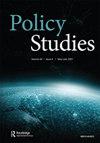“宗教正在参与:tick,干得好”:穆斯林气候中介的隐形化和工具化
IF 2.3
4区 管理学
Q2 PUBLIC ADMINISTRATION
引用次数: 3
摘要
“气候中介”是在不同治理水平和/或不同类型的行动者之间运作的“中间人”。基于信仰的行动者(FBAs)是一种人口众多但被忽视的潜在气候中介。在英国,穆斯林是第二大宗教信徒群体,但却被“排斥”,面临着广泛的伊斯兰恐惧症,以及其他多种交叉的不平等。从21个访谈中,我们分析了自我认同为穆斯林的个人的数据,以及他们与国家和非国家行为体之间的中介经历,以了解这些角色是如何表现的。我们发现,在与国家行为体和“主流”非政府组织接触时,穆斯林联邦机构作为气候中介是隐形的和/或工具化的,但在与来自共同信仰的其他人联络或在不同信仰的背景下行动时,可以有效地发挥这种作用。这种行动受阻的结果是,在“主流”论坛中缺乏气候行动的代表性或变革性战略,导致主观疲劳,政策设计不佳,穆斯林社区转而选择通过宗教间渠道和其他穆斯林之间进行调解。通过本文,我们试图纠正穆斯林气候中介机构的不可见性,并就政策文献和政策制定界如何理解气候中介机构提出关键问题。本文章由计算机程序翻译,如有差异,请以英文原文为准。
“The religions are engaging: tick, well done”: the invisibilization and instrumentalization of Muslim climate intermediaries
ABSTRACT “Climate intermediaries” are “go-betweens”, operating between levels of governance and/or between different types of actors. Faith-based actors (FBAs) are one populous yet neglected type of potential climate intermediary. In the UK, Muslims are the second largest group of religious adherents, yet are “othered”, and face widespread Islamophobia, alongside multiple other intersecting inequalities. Drawing from 21 interviews, we analyse data from individuals self-identifying as Muslim and their experiences of intermediation with state and non-state actors, to understand how such roles manifest. We find that Muslim FBAs are invisibilized and/or instrumentalized as climate intermediaries when engaging with state actors and “mainstream” ENGOs, but can assume such roles effectively when liaising with others from the shared faith or acting in interfaith contexts. The outcome of this obstructed action is a lack of representative or transformative strategies for climate action within “mainstream” fora, leading to subjective fatigue, poor policy design, and Muslim communities instead electing to intermediate through interfaith channels and between other Muslims. Through this article, we seek to redress the invisibilization of Muslim climate intermediaries, and raise critical questions about how climate intermediaries are understood, both within the policy literature, and in policy-making circles.
求助全文
通过发布文献求助,成功后即可免费获取论文全文。
去求助
来源期刊

Policy Studies
PUBLIC ADMINISTRATION-
CiteScore
5.40
自引率
4.50%
发文量
34
期刊介绍:
These changes at the structural level of the global system have impacted upon the work of public organizations either directly or indirectly and have broadened the field of action in policy studies. It has five main areas of intellectual interest: 1.To broaden the lens of policy analysis through the publication of research which locates policy-making within a theoretical, historical or comparative perspective. 2.To widen the field of enquiry in policy analysis through the publication of research that examines policy issues in a British, comparative, international or global context. 3.To promote constructive debate on theoretical, methodological and empirical issues in policy analysis.
 求助内容:
求助内容: 应助结果提醒方式:
应助结果提醒方式:


